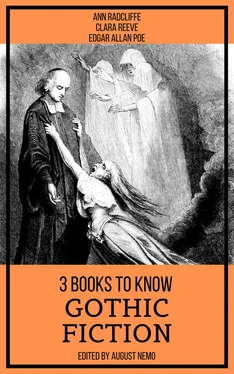‘I am now going to repose in you a confidence which will severely prove the strength of your honour. But before I disclose a secret, hitherto so carefully concealed, and now reluctantly told, you must swear to preserve on this subject an eternal silence. If you doubt the steadiness of your discretion — now declare it, and save yourself from the infamy, and the fatal consequences, which may attend a breach of your oath; — if, on the contrary, you believe yourself capable of a strict integrity — now accept the terms, and receive the secret I offer.’ Ferdinand was awed by this exordium — the impatience of curiosity was for a while suspended, and he hesitated whether he should receive the secret upon such terms. At length he signified his consent, and the marquis arising, drew his sword from the scabbard. —‘Here,’ said he, offering it to Ferdinand, ‘seal your vows — swear by this sacred pledge of honor never to repeat what I shall now reveal.’ Ferdinand vowed upon the sword, and raising his eyes to heaven, solemnly swore. The marquis then resumed his seat, and proceeded.
‘You are now to learn that, about a century ago, this castle was in the possession of Vincent, third marquis of Mazzini, my grandfather. At that time there existed an inveterate hatred between our family and that of della Campo. I shall not now revert to the origin of the animosity, or relate the particulars of the consequent feuds — suffice it to observe, that by the power of our family, the della Campos were unable to preserve their former consequence in Sicily, and they have therefore quitted it for a foreign land to live in unmolested security. To return to my subject. — My grandfather, believing his life endangered by his enemy, planted spies upon him. He employed some of the numerous banditti who sought protection in his service, and after some weeks past in waiting for an opportunity, they seized Henry della Campo, and brought him secretly to this castle. He was for some time confined in a close chamber of the southern buildings, where he expired; by what means I shall forbear to mention. The plan had been so well conducted, and the secrecy so strictly preserved, that every endeavour of his family to trace the means of his disappearance proved ineffectual. Their conjectures, if they fell upon our family, were supported by no proof; and the della Campos are to this day ignorant of the mode of his death. A rumour had prevailed long before the death of my father, that the southern buildings of the castle were haunted. I disbelieved the fact, and treated it accordingly. One night, when every human being of the castle, except myself, was retired to rest, I had such strong and dreadful proofs of the general assertion, that even at this moment I cannot recollect them without horror. Let me, if possible, forget them. From that moment I forsook those buildings; they have ever since been shut up, and the circumstance I have mentioned, is the true reason why I have resided so little at the castle.’
Ferdinand listened to this narrative in silent horror. He remembered the temerity with which he had dared to penetrate those apartments — the light, and figure he had seen — and, above all, his situation in the stair-case of the tower. Every nerve thrilled at the recollection; and the terrors of remembrance almost equalled those of reality.
The marquis permitted his daughters to change their apartments, but he commanded Ferdinand to tell them, that, in granting their request, he consulted their ease only, and was himself by no means convinced of its propriety. They were accordingly reinstated in their former chambers, and the great room only of madame’s apartments was reserved for the marchioness, who expressed her discontent to the marquis in terms of mingled censure and lamentation. The marquis privately reproved his daughters, for what he termed the idle fancies of a weak mind; and desired them no more to disturb the peace of the castle with the subject of their late fears. They received this reproof with silent submission — too much pleased with the success of their suit to be susceptible of any emotion but joy.
Ferdinand, reflecting on the late discovery, was shocked to learn, what was now forced upon his belief, that he was the descendant of a murderer. He now knew that innocent blood had been shed in the castle, and that the walls were still the haunt of an unquiet spirit, which seemed to call aloud for retribution on the posterity of him who had disturbed its eternal rest. Hippolitus perceived his dejection, and entreated that he might participate his uneasiness; but Ferdinand, who had hitherto been frank and ingenuous, was now inflexibly reserved. ‘Forbear,’ said he, ‘to urge a discovery of what I am not permitted to reveal; this is the only point upon which I conjure you to be silent, and this even to you, I cannot explain.’ Hippolitus was surprized, but pressed the subject no farther.
Julia, though she had been extremely mortified by the circumstances attendant on the discovery of her sentiments to Hippolitus, experienced, after the first shock had subsided, an emotion more pleasing than painful. The late conversation had painted in strong colours the attachment of her lover. His diffidence — his slowness to perceive the effect of his merit — his succeeding rapture, when conviction was at length forced upon his mind; and his conduct upon discovering Julia, proved to her at once the delicacy and the strength of his passion, and she yielded her heart to sensations of pure and unmixed delight. She was roused from this state of visionary happiness, by a summons from the marquis to attend him in the library. A circumstance so unusual surprized her, and she obeyed with trembling curiosity. She found him pacing the room in deep thought, and she had shut the door before he perceived her. The authoritative severity in his countenance alarmed her, and prepared her for a subject of importance. He seated himself by her, and continued a moment silent. At length, steadily observing her, ‘I sent for you, my child,’ said he, ‘to declare the honor which awaits you. The Duke de Luovo has solicited your hand. An alliance so splendid was beyond my expectation. You will receive the distinction with the gratitude it claims, and prepare for the celebration of the nuptials.’
This speech fell like the dart of death upon the heart of Julia. She sat motionless — stupified and deprived of the power of utterance. The marquis observed her consternation; and mistaking its cause, ‘I acknowledge,’ said he, ‘that there is somewhat abrupt in this affair; but the joy occasioned by a distinction so unmerited on your part, ought to overcome the little feminine weakness you might otherwise indulge. Retire and compose yourself; and observe,’ continued he, in a stern voice, ‘this is no time for finesse.’ These words roused Julia from her state of horrid stupefaction. ‘O! sir,’ said she, throwing herself at his feet, ‘forbear to enforce authority upon a point where to obey you would be worse than death; if, indeed, to obey you were possible.’—‘Cease,’ said the marquis, ‘this affectation, and practice what becomes you.’—‘Pardon me, my lord,’ she replied, ‘my distress is, alas! unfeigned. I cannot love the duke.’—‘Away!’ interrupted the marquis, ‘nor tempt my rage with objections thus childish and absurd.’—‘Yet hear me, my lord,’ said Julia, tears swelling in her eyes, ‘and pity the sufferings of a child, who never till this moment has dared to dispute your commands.’
‘Nor shall she now,’ said the marquis. ‘What — when wealth, honor, and distinction, are laid at my feet, shall they be refused, because a foolish girl — a very baby, who knows not good from evil, cries, and says she cannot love! Let me not think of it — My just anger may, perhaps, out-run discretion, and tempt me to chastise your folly. — Attend to what I say — accept the duke, or quit this castle for ever, and wander where you will.’ Saying this, he burst away, and Julia, who had hung weeping upon his knees, fell prostrate upon the floor. The violence of the fall completed the effect of her distress, and she fainted. In this state she remained a considerable time. When she recovered her senses, the recollection of her calamity burst upon her mind with a force that almost again overwhelmed her. She at length raised herself from the ground, and moved towards her own apartment, but had scarcely reached the great gallery, when Hippolitus entered it. Her trembling limbs would no longer support her; she caught at a bannister to save herself; and Hippolitus, with all his speed, was scarcely in time to prevent her falling. The pale distress exhibited in her countenance terrified him, and he anxiously enquired concerning it. She could answer him only with her tears, which she found it impossible to suppress; and gently disengaging herself, tottered to her closet. Hippolitus followed her to the door, but desisted from further importunity. He pressed her hand to his lips in tender silence, and withdrew, surprized and alarmed.
Читать дальше












